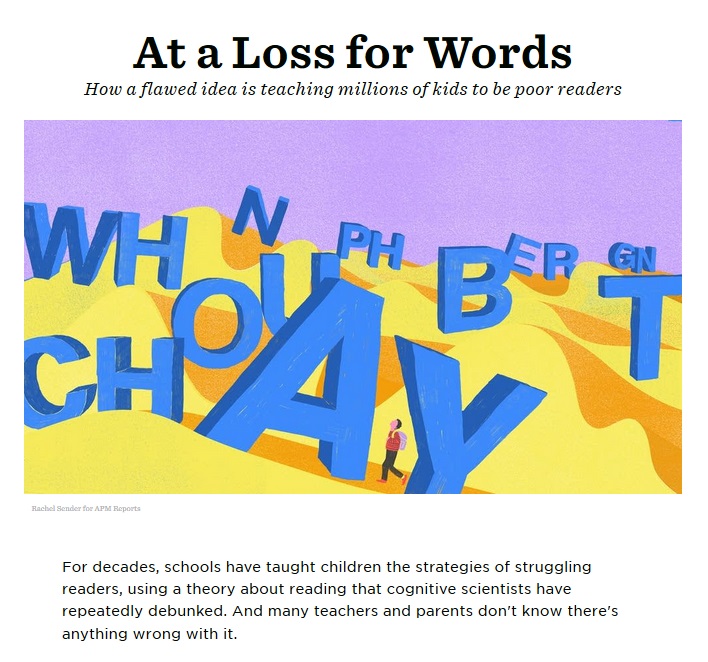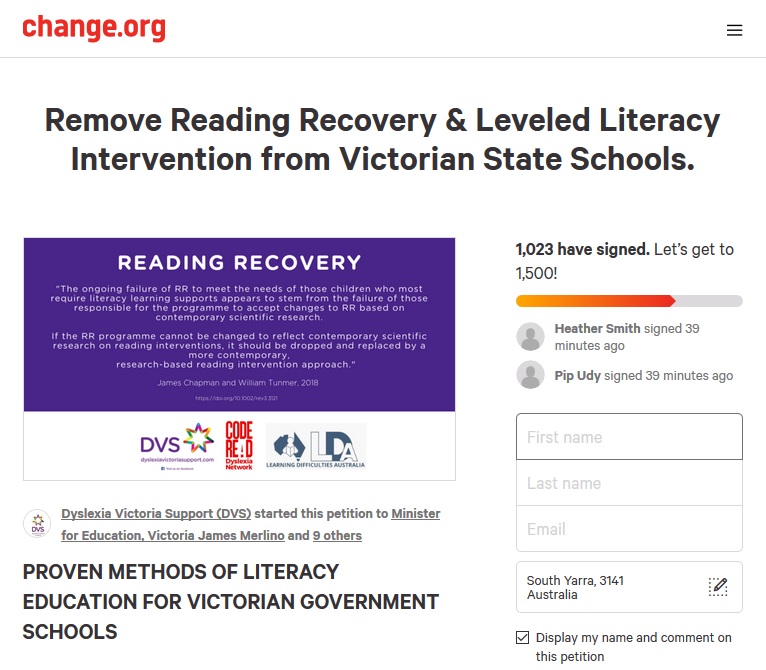Survey (with amazing prizes) of our local schools
2 Replies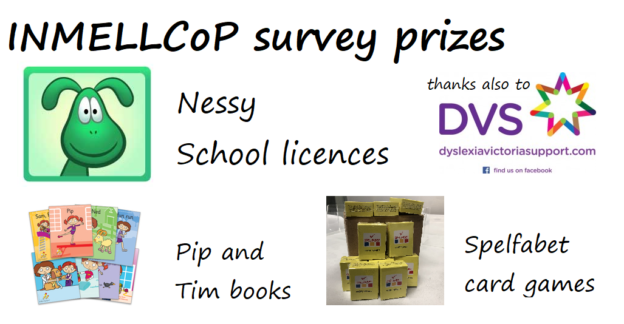
Last year, some colleagues and I decided to start an Inner North Melbourne Early Language and Literacy Community of Practice (INMELLCoP), to bring together local teachers, speech pathologists, psychologists and others, build knowledge of language and literacy best practices, and share resources, ideas and experience.
Our inspiration was Pam Snow and colleagues’ Bendigo group, BELLCoP. We sought to complement not compete with Nathaniel Swain and colleagues’ inner Melbourne group MELLCoP, since renamed Think Forward Educators. Our focus is further north, on the Yarra, Darebin and Moreland local government areas.
We decided to gather some data to inform our work, by surveying local primary schools about how they currently teach reading and spelling, and offering a prize draw for those assisting. Then COVID-19 hit, and we had to focus on other priorities for a while.
Our survey is finally available, so if you work in a school in Moreland, Yarra or Darebin, please complete it before 30 October, by clicking on this link. It takes 5-10 minutes. We’ve also emailed information about the survey to relevant local schools.
We’re a bit astonished by the thousands of dollars worth of prizes we’re able to offer to those filling in our survey, thanks to the extraordinary generosity of Nessy, Dyslexia Victoria Support and Little Learners Love Literacy. The prizes are:
- Three Nessy school licences comprising 10 Dyslexia Teacher training programs, 30 Dyslexia Quest Screeners, enough Nessy Reading and Spelling programs for all the students in Years 2 and 3, 10 Nessy Fingers typing programs and technical support from Nessy (each valued at more than $4000), plus some Nessy games.
- A full set of Little Learners Love Literacy Pip and Tim books (Stage 1 to Stage 7 Unit 5) valued at $480.
- 24 decks of the new Spelfabet “short vowel” wordbuilding card game, valued at $288. These are hot off the presses and currently only available from DSF (I’m yet to make a new video and work out how to sell them as they’re printed cards not downloads).
- A Spelfabet Teacher/Clinician Whole Kit of download-and-print materials, valued at $209.
- A full set of 81 decks of Spelfabet download-and-print phonics playing cards valued at $90.
The survey closes at the end of this month and the prize draw will take place at the next INMELLCoP virtual meeting at 6.30pm on November 4th. This meeting will also consider the de-identified survey data, and how to respond to it in 2021.
If you’re a local and would like to attend the meeting, you can register here. We will send out the Zoom link on the day. I’ll put an INMELLCoP home page on my website soon, to publicise our news and schedule.
If you’re not in our area, maybe you’d like to start something similar? We’d love to hear about it if you do.
Arrowsmith: the triumph of marketing over science
3 Replies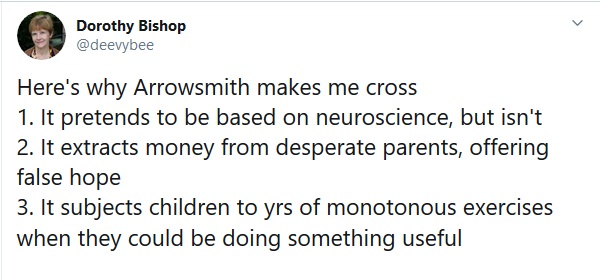
Barbara Arrowsmith-Young is back touring Australia, promoting her controversial Arrowsmith program to parents and teachers of children with learning difficulties.
Oxford Psychology Professor and all-round legend Dorothy Bishop succinctly summarised informed professional thought on this program a couple of years ago in this tweet:

Barbara Arrowsmith-Young got famous by writing a book called The Woman Who Changed Her Brain. But as Macquarie University Professor Anne Castles has pointed out, we all change our brains every day. It’s called learning. (more…)
Four cheers for Emily Hanford
8 Replies
American Public Media journalist Emily Hanford has made some accessible, powerful and widely-discussed documentaries about the gap between reading science and classroom practice in the US. It’s a gap that also exists here in Australia, and elsewhere in the English-speaking world.
If you haven’t listened to her documentaries yet, please make the time to do so. You can click on the pictures below to access each one.
She started in September last year with this:
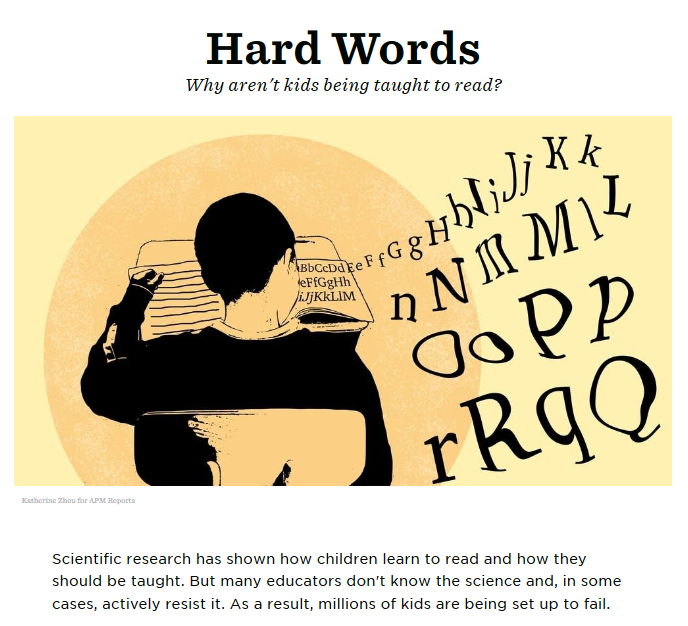 In October 2018, she followed up with this:
In October 2018, she followed up with this:
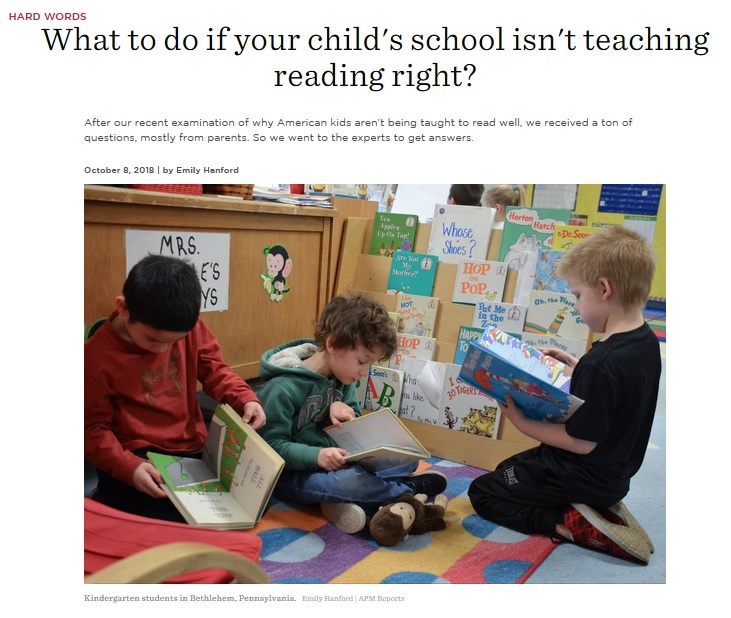 She also wrote a New York Times opinion piece entitled “Why are we still teaching reading the wrong way?”
She also wrote a New York Times opinion piece entitled “Why are we still teaching reading the wrong way?”
My apologies to blog subscribers who missed these till now. I circulated them on social media but was too stupidly busy with my new office and sick mother to write a blog post about them.
In January this year, on National Public Radio, Emily made:
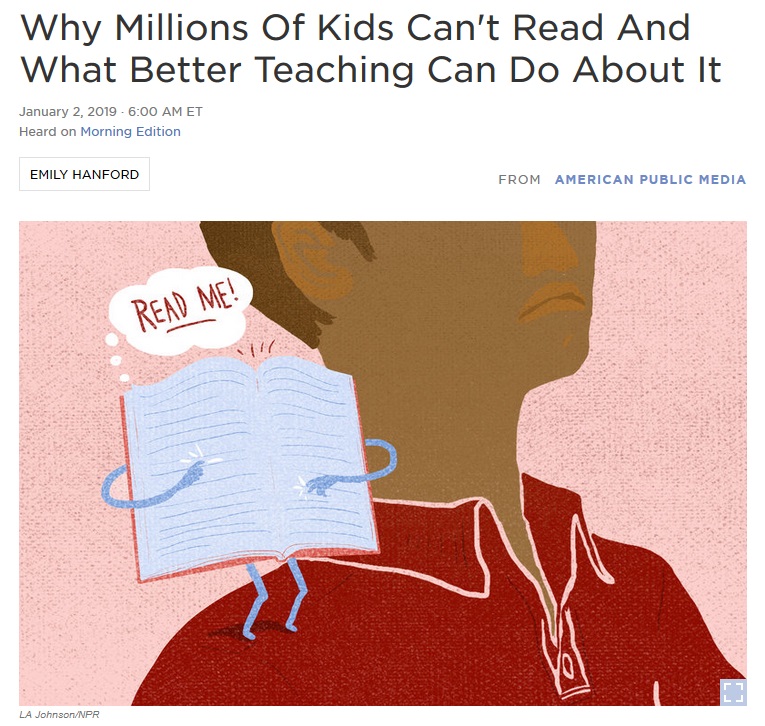 In March came this video interview called What Teachers Should Know About the Science of Reading:
In March came this video interview called What Teachers Should Know About the Science of Reading:
Emily’s most recent, again brilliant contribution to aligning teaching with reading science in a pro-teacher, pro-equity way, is this:
I very dare you to get to the end of this documentary and not be gobsmacked by “Father of Whole Language” Ken Goodman’s extraordinary comment “My science is different”.
Goodman shows he is simply not interested in the mountain of scientific evidence contradicting his theory-and-observation-based ideas about how children learn to read, yet his ideas are still the basis of the “three-cueing system” approach to teaching reading that’s still widely used.
The game is up, the facts are out, and thanks to Emily Hanford and APM they’re in a free, accessible and easily digestible format. Please share them with every teacher, parent and other person who might be able to help get a more scientific understanding of how to teach reading into our education system.
I don’t enjoy having to spend a lot of my day undoing poor habits caused by well-meaning, hard-working teachers who were taught half-baked “my science is different” ideas at university and by “meaning-first” educational consultants. And I’m sure that (as the US Reading League people say) when teachers know better, they will do better, and so will their students.
Last chance to register for LDA’s David Kilpatrick seminars
5 Replies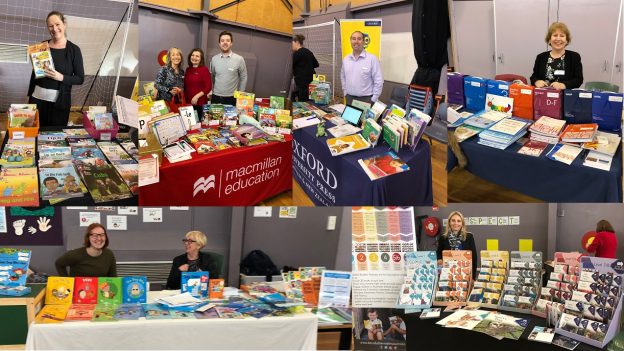
Registrations close shortly for this month’s LDA seminars by David Kilpatrick. I’m not sure exactly when they close for Perth and Cairns, but Melbourne’s close on 8th August. Adelaide & Sydney are already sold out. The seminar on the 19th at Melbourne Town Hall will include 17 supplier displays (details below) to browse from 8.15-9.00am and during the breaks.
Dr Kilpatrick is the author of the excellent Essentials of Assessing, Preventing and Overcoming Reading Difficulties and Equipped for Reading Success, and you might have also seen him talk online (e.g. here, here, here, here and here).
I recently assessed a teenager with the kind of reading and spelling difficulties I hope these seminars will soon help stamp out. He’s a classic Compensator. Intelligent, hard-working, with good oral language skills, but very poor phonemic awareness and proficiency (<1st percentile on the CTOPP-2 Elision subtest) and thus weak word-level reading and spelling.
He finds it hard to sound out unfamiliar words, tending to look at the start and end of words and guess the middles. If you give him a wordlist including similar-looking words like “complete” and “compete”, he probably won’t notice they’re different.
His teachers aren’t aware of the extent of his reading difficulties because they don’t test word-level reading or phonemic awareness, and when this student reads connected text he gets most of the words right, by compensating for his poor decoding with his good oral language. They notice his poor spelling, and try to help him with it, but it’s not really their area of expertise. (more…)
We need GOOD practice, not common practice
15 Replies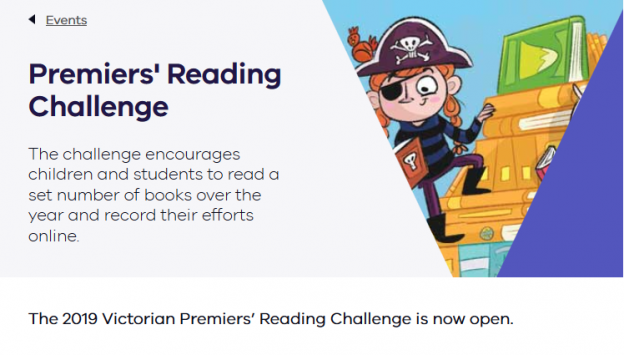
I wrote an opinion piece in The Age newspaper this week called “Premiers’ Reading Challenge no fun for kids who can’t read“, arguing we need to close the gap between research and practice in early literacy education, so more kids can enjoy, not dread, the Premiers’ Reading Challenge.
I hope it’s helped put another nail in the coffin of common, but extremely poor, literacy-teaching practices like rote wordlist-memorisation (the “magic words” etc) without regard to their structure, incidental-not-systematic phonics, and encouraging kids to guess words from first letter, sentence structure and context/pictures.
I hope it also helps kill off the idea that reading is natural, and replace educational blah-blah about reader identity and teacher literacy philosophy with more interesting discussions about what science tells us about how to best teach reading.
I’m sorry they didn’t include my link to Emily Hanford’s great “Hard Words: why aren’t kids being taught to read” audio documentary, but otherwise happy with it, especially the mention of David Kilpatrick’s seminar on 19 August at Melbourne Town Hall (have you signed up yet? He will also speak in Perth and Cairns, and Sydney and Adelaide, but they’re booked out).
Of course letters to the editor appeared the next day disagreeing with me. People who agree with something they read in the paper don’t generally rush to write to the editor. Editors don’t usually give a right of reply to these letters, so I’m giving myself one here. (more…)
Ros Neilson on the Foundations of Early Literacy Assessment (FELA)
2 Replies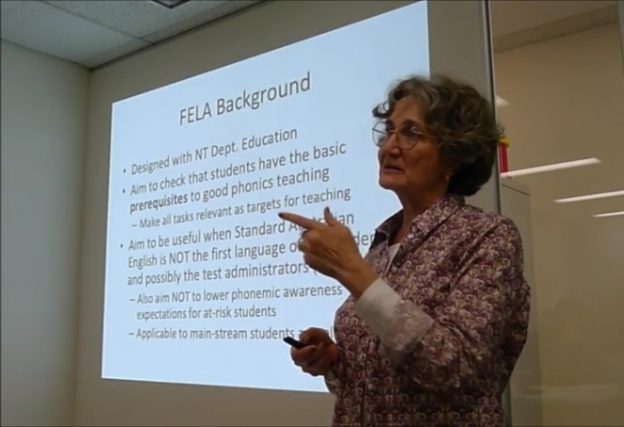
Last month at our office we had the pleasure of hosting Speech Pathology legend Roslyn Neilson for a talk about her newish early literacy assessment, the FELA.
The FELA is intended to supersede two of Ros’s previous tests, the SPAT-R and SEAPART, and help teachers, therapists and others assess phonemic awareness and alphabetic knowledge, which are vital, teachable early literacy skills.
The FELA can be used in preschool screening as well as progress monitoring through the early years of primary school.
On the day, we decided to video the session, as we could only fit 30 people into our biggest room (which Ros scarily called a Conference Centre), and had to turn a few people away, plus many other interested people were too far off or too busy to come.
Here’s the video, with my apologies that it’s blurry at the start and there is a short break and you might need to turn up the volume towards the end (camera malfunction). Ros’s slides can be downloaded here.
Thanks so much to Ros for freely sharing her time and expertise so generously, and for the chocolates, which we are still enjoying. The FELA is available from Ros’s website, takes up to 30 minutes per child and I think is very reasonably priced at $198 inc GST. If you’d like to take a look at it and you’re in Melbourne, Ros has left us a copy, and you’d be welcome to browse it.
Thanks also to fab Spelfabet staff Renee Vlahos, Caitlin Stephenson and Tessa Weadman (yes, I am going to put them on the website soon) for their help, and to my brother for the huge bag of apples that got me making easy, delicious apple cake (here’s the recipe, but I microwaved and drained the apples, and beat the eggs). After I bought my Goodwill Wine I found out they raise funds for Code Read Dyslexia Network. Please consider when next ordering wine.
My brother just gave me ANOTHER huge bag of apples, so maybe that means I should invite another speaker. Ros is a pretty hard act to follow, but let me know if you have ideas/suggestions.
Petition to dump Reading Recovery and Leveled Literacy Intervention
13 Replies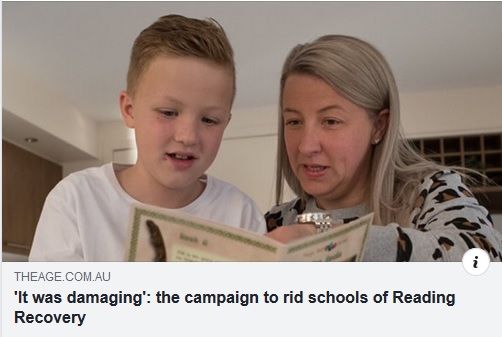
If you’re in Australia’s state of Victoria you might have seen yesterday’s article in The Age online about a new petition to remove Reading Recovery and Leveled Literacy Intervention from our government schools. It appears to have been bumped by election coverage yesterday, but should be in the paper version of The Age today.
The petition is backed by three leading groups which advocate for children with learning difficulties: Dyslexia Victoria Support, Code Read Dyslexia Network and Learning Difficulties Australia.
I have signed this petition and am quoted in The Age in support of it, because children with learning difficulties need programs with solid, scientific evidence behind them.
Reading scientists now know that children simply do not learn to read by memorising whole words or guessing words from pictures, context and/or first letters. Children who seem to be doing this are actually taking the words apart and figuring out how the sounds and letters work, something many kids can’t do without explicit and direct instruction.
Sounding out right through words should simply not be reserved as a strategy of last resort, as Reading Recovery’s Dame Marie Clay recommended.
The US Reading League has an excellent video online in which the very witty Dr Steve Dykstra talks about how to understand scientific research and statistics, and unpacks the “gold standard” research on Leveled Literacy Intervention and Reading Recovery.
If you don’t have time to watch the whole thing, and your school is using Leveled Literacy Intervention, start at 52.33 on the video clock. If your school still uses Reading Recovery, start at minute 1:03:43.
The DVS/CR/LDA petition to replace Reading Recovery and Leveled Literacy Intervention is addressed to our state Education Minister, and you can read and sign it online here. It has just clocked up over 1000 signatures, so I hope many more readers of this blog will also sign and share it.
Struggling readers and their teachers deserve more effective programs.
Australians keen to learn about the most effective programs/approaches for struggling readers should attend seminars by US academic and experienced school psychologist, Dr David Kilpatrick, who will be the guest speaker for the Learning Difficulties Australia National Tour in August.
These seminars will be held in Perth, Adelaide, Melbourne, Cairns and Sydney. Dr Kilpatrick is the author of the very accessible Essentials of Assessing, Preventing and Overcoming Reading Difficulties, so I’m looking forward to getting him to sign my dog-eared copy when he’s in Melbourne.
If you are in/near one of the seminar locations and have access to a school staff room, please print a copy or two of the relevant seminar flyer and leave it/them on the table and/or noticeboard, or otherwise circulate it to people who might be interested, to help LDA promote the tour.
Please also book early to avoid disappointment, as Legendary Kerrie, the LDA admin person, tells me some of these seminars are filling fast.
PS I was just interviewed on radio 3AW about this issue, you can hear the interview here.

